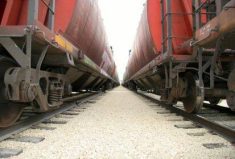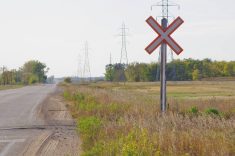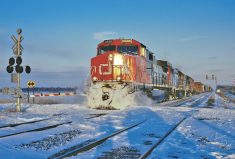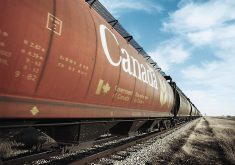CN Rail will soon contact farmers with private crossings to discuss making them safer by Nov. 27, 2021, as required under federal regulations introduced by the former Conservative government in 2014.
But before letters are mailed, CN is asking provincial farm groups, including Manitoba’s Keystone Agricultural Producers (KAP), for input to ensure it strikes the right tone, Sean Finn, CN Rail’s executive vice-president of corporate services and chief legal officer, said in a recent interview.
“I didn’t want to get off on the wrong foot by sending a letter to our neighbours that was either misconstrued or didn’t lead to the right result,” Finn said.
Read Also

Mazergroup’s Bob Mazer dies
Mazergroup’s Bob Mazer, who helped grow his family’s company into a string of farm equipment dealerships and the main dealer for New Holland machinery in Saskatchewan and Manitoba, died July 6 from cancer.
“Our approach is, let’s have a dialogue. This is all about railway safety, and I am convinced any farmer who has a railway track going through his farm will not be against having a conversation with us at CN about railway safety. When it comes to who is going to pay for what, that’s another conversation. That’s premature at this stage. Let’s figure out what’s out there.”
CN Rail also consulted its agricultural advisory council established last year to build closer ties with grain farmers.
Why it matters: Both CN and CP Rail have more than 8,000 private crossings, many of which are used by farmers to get equipment between fields. If the crossings require safety upgrades farmers will be expected to contribute to the cost.
Both railways aren’t sure of where all the private crossings are. In some cases farmers have built their own, Finn said.
“This is about safety,” he said. “We want to make sure the crossing is safe for you and for us. And by the way if you don’t need the crossing anymore tell us and we will clean it up, or if it is not safe tell us.”
CP Rail has also been working with KAP on a letter to send to farmers with private crossings as a followup to a letter the railway mailed in late March to landowners with private crossings along its line that runs from Minnedosa, Man., to Bredenbury, Sask. It warned landowners that if they didn’t sign a legal agreement by April 30 obliging them to pay CP Rail for upgrades and ongoing maintenance, their crossing would be removed.
The short deadline and few details about costs to landowners caused a furor. When the deadline passed CP told KAP private crossings are not in immediate danger.
CP’s new letter says under federal regulations CP Rail is obliged to improve grade crossing safety in Canada, and to meet the requirements of the regulations by Nov. 27, 2021.
“It is our intent to work collaboratively with private authorities, including entering into a private crossing agreement,” the letter from CP Rail official Andy Pfeifer states in part. “If, after taking all reasonable steps, the private authority cannot be determined or a signed private crossing agreement is not in place, it will lead to the removal of the crossing.”
In the meantime, KAP will ask Transport Minister Marc Garneau to extend the deadline for upgrading private crossings, KAP general manager Patty Rosher said in an interview May 20.
KAP will also seek federal funding to help farmers with crossing upgrades, she said.
Finn hopes common sense will be used when considering what upgrades.
“At CN I can guarantee you that will be our driving force, but this is being done for safety purposes,” he added. “It’s not a money issue right now. If we can save lives from crossing both private and public (crossings) that’s my No. 1 preoccupation. The Railway Safety Act review two years ago said the No. 1 cause of (railway) fatalities is crossing accidents.
“If we have to put a stop sign up on some private crossings CN may say to our neighbours we’ll provide the stop sign and we’ll put it up, but a farmer in his own field shouldn’t need his own stop sign, right?”
However, ensuring those crossing tracks can see trains coming, is one of the requirements under the new regulations. That could require removing visual obstructions, such as trees.
Dauphin-Swan River-Neepawa MP Dan Mazier wrote Garneau April 24 asking him to extend the Nov. 27, 2021 deadline for the crossing upgrades.
And “to consider working with CP to pursue a solution that does not include burdening Canadian landowners with such costs.”
Mazier said one of his constituent’s crossings would cost $34,000 to upgrade.
“There’s no way farmers should have to pay for this,” Mazier said in an interview May 1. “They might be crossing three times a year and saving miles on their equipment. There’s absolutely no way they should have to pay. They shouldn’t have to put out cross-arms. A gate that swings across and a lockout is all that’s really required. The regulations should recognize that. Common sense has to take over. In the name of safety that’s all you need.”
Mazier, who was KAP’s president in 2014 and a farmer, doesn’t recall Transport Canada consulting with farmers about proposed changes to crossing regulations, despite the financial implications for farmers.




















